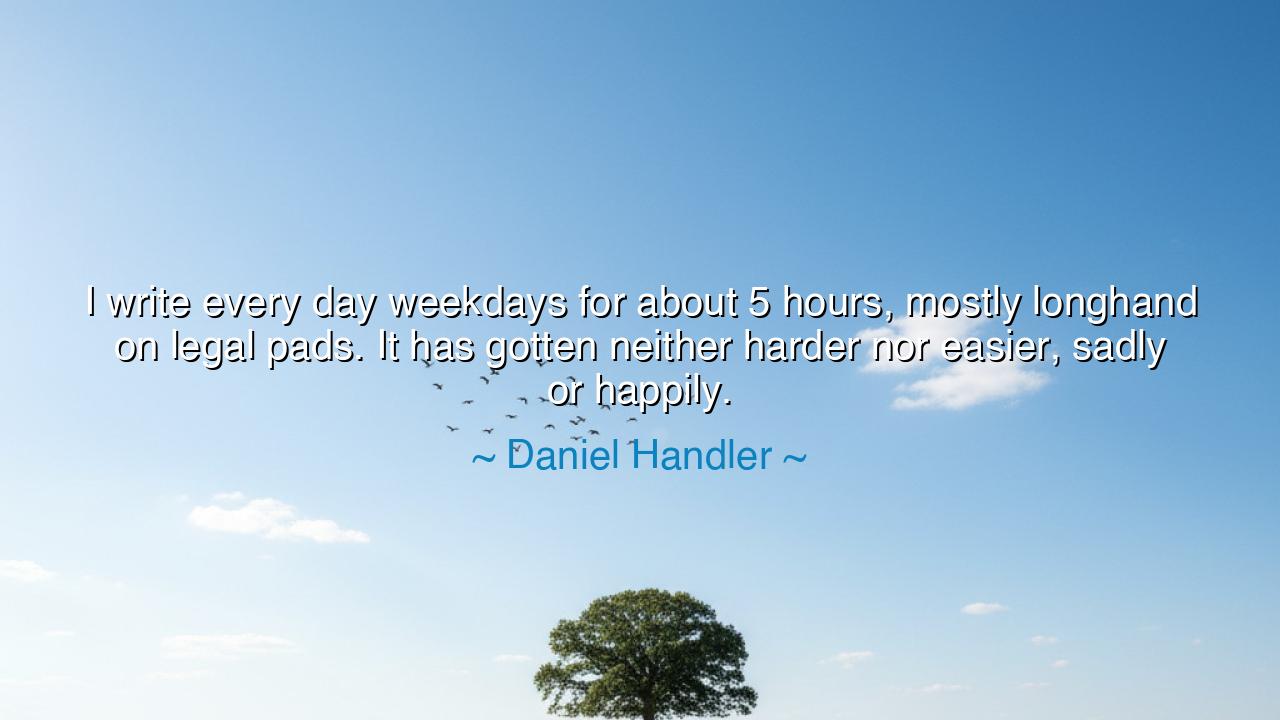
I write every day weekdays for about 5 hours, mostly longhand on
I write every day weekdays for about 5 hours, mostly longhand on legal pads. It has gotten neither harder nor easier, sadly or happily.






There are few labors as sacred and as merciless as the labor of creation. Daniel Handler, known to many by his pen name Lemony Snicket, revealed a quiet truth when he said: “I write every day weekdays for about 5 hours, mostly longhand on legal pads. It has gotten neither harder nor easier, sadly or happily.” In these simple words lies a profound meditation on discipline, persistence, and the constancy of struggle in the life of an artist. His statement is neither triumphant nor despairing; it stands like an ancient stone — weathered, honest, and unmoved by passing seasons. Handler reminds us that mastery is not the end of difficulty, but the peace one finds in living beside it.
The origin of this quote lies in Handler’s reflections on his craft — the daily rhythm of writing that shaped his darkly whimsical stories. Unlike those who romanticize inspiration, he speaks of routine: five hours a day, pen to paper, longhand on yellow legal pads. This is no small detail. It is the image of a man engaged in an ancient ritual — of shaping thought into form with the slow, deliberate pressure of ink upon page. He acknowledges that the process, even after years of practice, has not grown easier or more merciful. There is wisdom in this admission: that art resists comfort, and that creation demands from its servants not perfection, but endurance.
To the ancients, the struggle of repetition was a path toward virtue. The sculptor Phidias, who carved the statues of the gods for the Parthenon, is said to have labored day after day until his hands bled, not because the marble became softer, but because his soul grew steadier. The work did not ease, but his acceptance of it became his mastery. So too does Handler’s devotion echo that truth — that the act of writing, like prayer or meditation, is less about victory than about continuity. One does not overcome the difficulty; one learns to walk beside it with grace.
Handler’s phrase “sadly or happily” speaks to the paradox that confronts every creator. The constancy of labor brings no final joy and no final sorrow — only a kind of peace born of surrender. To write daily, to face the same doubts, the same silence, the same resistance, is to encounter oneself in raw form. There is no reward of ease waiting beyond the years, only the quiet realization that the doing itself is the purpose. Like the farmer tilling the same soil each season, the writer learns that meaning lies not in harvests, but in the act of tending.
This truth extends beyond the writer’s desk. In every craft, whether of art, trade, or spirit, the illusion of “ease” tempts us. We dream that with time, our struggles will vanish, that our efforts will one day glide without resistance. Yet Handler’s wisdom destroys that illusion. Life itself, like writing, never becomes easier — it only becomes more familiar. The mountains do not flatten; we simply grow accustomed to climbing. And there is beauty in that constancy, for it means that meaning does not fade once the summit is reached. Every ascent remains sacred.
Consider Leonardo da Vinci, who in his final days confessed that he had “offended God and mankind” because his art had not reached perfection. Yet he had spent a lifetime in pursuit of beauty. His frustration, like Handler’s admission, reveals that the work of the human spirit is eternal — a dance between persistence and imperfection. The great creator does not seek the end of struggle, but the deepening of understanding. To labor daily, knowing the task will never be conquered, is not futility; it is devotion of the highest order.
The lesson, then, is clear and timeless: do the work, every day. Do not wait for inspiration or ease. Let your craft — whatever it may be — become your daily ritual, your discipline, your mirror. Accept that some things in life remain forever difficult, yet eternally worthwhile. Like Handler, find steadiness in the act itself, not in its results. The true artist, the true seeker, learns to sit beside challenge as one sits beside an old friend — not expecting comfort, but companionship on the long road of creation.
And so, to those who seek meaning in their labor, let this be your guide: do not hope for ease; hope for endurance. Each day, return to your tools — your pen, your hammer, your voice, your hands — and begin again. The work will not greet you with kindness, but it will reward you with truth. For in the end, the constancy of effort is not a burden, but a form of grace. It is the quiet triumph of those who, like Daniel Handler, have discovered that even when the path grows neither harder nor easier, the walking itself becomes sacred.






AAdministratorAdministrator
Welcome, honored guests. Please leave a comment, we will respond soon